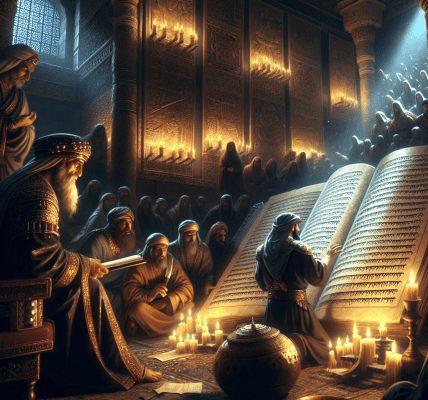James’s Epistle of Enduring Faith: The Enlightened Guide to Divine Wisdom and Loving Resilience
Once upon a time, in a small, bustling town located in the heart of the Roman Empire, lived a humble yet wise man named James, a servant of God, and of the Lord Jesus Christ. He was a member of the Twelve Tribes scattered among the nations and was fervently devoted to conveying the wisdom of God to his brethren. This is the story of a letter he once wrote, guiding them to pure faith, a worthwhile life, and eternal wisdom.
James began his letter with rejoicing, empowering his brothers, advising them of a strange and unique joy they should feel whenever they are enveloped by various trials. He assured them that hardships were not intended as punishment but to test their faith, to foster robust perseverance within them. James counselled, though his own heart had seen its fair share of trials and tribulations.
“Let trials bring joy because they’re nurturing patience,” he wrote, imbuing his words with that divine wisdom he frequently received from God. He insisted upon allowing patience to complete its work, so they may be whole, complete and lacking nothing. He knew that fullness of faith didn’t happen overnight. It was a journey that would take a lifetime.
However, he also understood that not everyone was equipped with the wisdom to see trials as joy, so he made it clear: “If any of you lack wisdom,” he prescribed, “you should ask God, who gives generously to all without finding fault, and it will be given to you.” He knew God was infinite in his benevolence, always ready to provide.
Yet with advice, James also issued a warning. He remarked on the one who doubts, the one who is like a wave of the sea, driven and tossed by the wind. He told them about the double-minded man, unstable in all he does, and how he should not expect to receive anything from the Lord. Faith without wavering, he emphasized, was the key to divine access and blessings.
James touched on the subject of social status, reminding his brothers that it held no meaning in the face of faith. He urged the humble brother to take pride in his high position, and the rich, in contrast, to turn a humble eye toward his transient wealth. Life and all its fortunes wither away much like a flower in the blazing sun.
Addressing the act of temptation, James was stern. He warned them not to be deceived. He emphasized that God could not be tempted by evil, nor does he tempt anyone. Instead, it is a person’s own desire that lures and entices them into sin. When sin is fully grown, it gives birth to death, he cautioned, instilling the gravity of their choices.
Using the backdrop of moral and ethical righteousness, James reminded them of their holy heritage — they were a kind of firstfruits of all God’s creation. He encouraged them to lead a righteous life saying, “My beloved brethren, be quick to listen, slow to speak and slower to wrath.” He impressively communicated that God’s righteousness could not be achieved through human anger.
In conclusion towards the end of his letter, he implored his brothers to rid themselves of all moral filth and urged them to humbly accept the word planted in them, capable of saving their souls. Having outlined the path of righteousness, he instructed them not merely to hear the word but act upon it. A man peering into a mirror quickly forgets his appearance, but continually heeding God’s perfect law brings blessings to those who persevere in living according to His teachings.
James’ letter served an invaluable guide, depicting a blend of divine wisdom and love. He relentlessly imparted the power of faith, resilience hidden in trials, the transient nature of worldly riches, and the perilous consequences of sin. His enlightened words seeped into hearts, striving to bring forth a reality within his tribe – a reality bearing the mirror image of the teaching of James, a humble servant of God, and of the Lord Jesus Christ.



